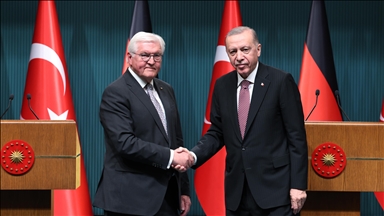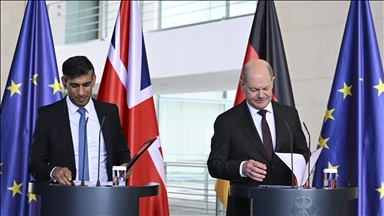Germany to gradually ease COVID-19 lockdown
Government extends lockdown measures until May 3, with relaxation for small shops; schools to gradually reopen next month

BERLIN
Germany is set for an extended coronavirus lockdown of two more weeks until May 3, after Chancellor Angela Merkel and premiers of federal states agreed on a roadmap to gradually ease restrictions.
Speaking at a news conference in Berlin on Wednesday, following a video conference with the state premiers, Merkel underlined that while Germany had some success in battling the virus’ spread, the situation is still fragile, and the outbreak is far from being contained.
“We must understand that we have to live with the virus until a medication, especially a vaccine is found. And we have to secure what we have achieved so far,” she said, referring to the slowing trend in the number of coronavirus infections.
Merkel said most of the restrictions on public life will be extended at least until May 3, with relaxations for small shops and stores with less than 800 square meters, but restaurants and cafes will remain closed until further notice.
She said the government now “strongly recommends” citizens wear masks during shopping and on public transportation.
Some school will gradually reopen after May 4, beginning with senior students and those close to graduation.
Last month the German government imposed strict lockdown measures, ordering all non-essential shops to close, canceling festivals and sports events, and banning any social contact among more than two people in public.
According to the roadmap agreed on Wednesday, the existing ban on large public events will remain in effect at least until the end of August.
Border controls extended
Meanwhile, the Interior Ministry has announced that border checks with five neighboring countries -- Austria, France, Switzerland, Luxembourg, and Denmark -- were also extended until May 4.
Travelers without a valid reason are not allowed to cross the border.
Germany and all five neighboring countries are in the Schengen area, Europe’s border-free travel zone.
New cases slowing
Germany has the fifth-highest tally of reported COVID-19 infections in the world, behind the U.S., Spain, Italy, and France.
The country’s death toll from the virus rose to 3,546 on Wednesday, surpassing those reported by China, where the pandemic began in December.
But the rate of new infections has continued to slow down, and remained below 3,000 for a third consecutive day.
The number of people infected with the virus stand at 133,154, according to data analysis firm Risklayer and the Karlsruhe Institute of Technology, which compile real-time figures from nearly 400 local authorities.
Germany’s disease control agency, the Robert Koch Institute, has reported that nearly 72,600 people have recovered from the virus so far.
The novel coronavirus has spread to at least 185 countries and regions since emerging in China last December, with the U.S. and Europe now the hardest-hit areas.
Worldwide infections have topped 2 million, with the death toll more than 130,000 and over half a million recoveries, according to data compiled by the U.S.’ Johns Hopkins University.
Anadolu Agency website contains only a portion of the news stories offered to subscribers in the AA News Broadcasting System (HAS), and in summarized form. Please contact us for subscription options.







